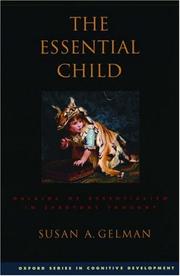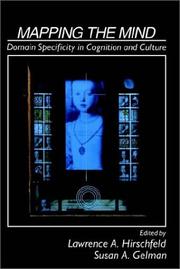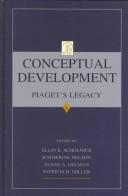| Listing 1 - 10 of 12 | << page >> |
Sort by
|

ISBN: 9780195181982 0195181980 0195154061 9780195154061 1280704225 9786610704224 0198035055 Year: 2003 Publisher: Oxford Oxford University Press
Abstract | Keywords | Export | Availability | Bookmark
 Loading...
Loading...Choose an application
- Reference Manager
- EndNote
- RefWorks (Direct export to RefWorks)
This text synthesizes 15 years of empirical research on essentialism into a coherent framework, examining children's thinking and ways in which language influences thought. It shows that children do not come into the world as passive recipients of data.
Categorization (Psychology) in children. --- Cognition in children. --- Children --- Kognitiv utveckling hos barn. --- Kind. --- Kognition. --- Language. --- Children -- Language. --- Categorization (Psychology) in children --- Cognitive psychology --- Psycholinguistics --- Catégorisation (psychologie) chez l'enfant --- Cognition chez l'enfant --- Enfants --- Langage
Book
Abstract | Keywords | Export | Availability | Bookmark
 Loading...
Loading...Choose an application
- Reference Manager
- EndNote
- RefWorks (Direct export to RefWorks)
Book
ISBN: 9780199361069 Year: 2014 Publisher: New York, NY : Oxford University Press,
Abstract | Keywords | Export | Availability | Bookmark
 Loading...
Loading...Choose an application
- Reference Manager
- EndNote
- RefWorks (Direct export to RefWorks)
Social perception. --- Social perception in children. --- Social psychology. --- Perception sociale --- Perception sociale chez l'enfant --- Psychologie sociale --- waarneming --- Social psychology --- kinderen --- sociale psychologie --- baby's --- cognitieve psychologie

ISBN: 0521429935 0521419662 0511752903 Year: 1994 Publisher: Cambridge Cambridge University Press
Abstract | Keywords | Export | Availability | Bookmark
 Loading...
Loading...Choose an application
- Reference Manager
- EndNote
- RefWorks (Direct export to RefWorks)
What is the nature of human thought? A long dominant view holds that the mind is a general problem-solving device that approaches all questions in much the same way. Chomsky's theory of language, which revolutionised linguistics, challenged this claim, contending that children are primed to acquire some skills, like language, in a manner largely independent of their ability to solve other sorts of apparently similar mental problems. In recent years researchers in anthropology, psychology, linguistic and neuroscience have examined whether other mental skills are similarly independent. Many have concluded that much of human thought is 'domain-specific'. Thus, the mind is better viewed as a collection of cognitive abilities specialised to handle specific tasks than a general problem solver. This volume introduces a general audience to a domain-specificity perspective, by compiling a collection of essays exploring how several of these cognitive abilities are organised.
psychologie --- cognitieve psychologie --- domeinspecificiteit --- 159.9 --- 303 --- 303 Methoden bij sociaalwetenschappelijk onderzoek --- Methoden bij sociaalwetenschappelijk onderzoek --- Health Sciences --- Psychiatry & Psychology --- Cognition and culture --- Human information processing --- Schemas (Psychology) --- Psychological schemas --- Schemata (Cognition) --- Schemata (Psychology) --- Scripts (Psychology) --- Cognition --- Information processing, Human --- Bionics --- Information theory in psychology --- Perception --- Culture and cognition --- Culture --- Ethnophilosophy --- Ethnopsychology --- Socialization --- Cognitive psychology --- Human information processing. --- Cognition and culture. --- Mental models --- Models, Mental

ISBN: 0521374979 0521065445 0511983689 Year: 1991 Publisher: Cambridge Cambridge University Press
Abstract | Keywords | Export | Availability | Bookmark
 Loading...
Loading...Choose an application
- Reference Manager
- EndNote
- RefWorks (Direct export to RefWorks)
From the time of birth through the early school years, young children rapidly acquire two complex cognitive systems: They organize their experiences into concepts and categories, and they acquire their first language. How do children accomplish these critical tasks? How do conceptual systems influence the structure of the language we speak? How do linguistic patterns influence how we view reality? These questions have captured the interest of such theorists as Piaget, Vygotsky, Chomsky and Whorf but until recently very little has been known about the relation between language and thought during development. Perspectives on Language and Thought presents current observational and experimental research on the links between thought and language in young children. Chapters from leading figures in the field focus on the acquisition of hierarchical category systems, concepts of time, causality, and logic and the nature of language learning in both peer and adult-child social interactions.
Categorization (Linguistics) --- Cognition in children --- Language acquisition --- Social interaction in children --- Child psychology --- Acquisition of language --- Developmental linguistics --- Developmental psycholinguistics --- Language and languages --- Language development in children --- Psycholinguistics, Developmental --- Interpersonal communication in children --- Psycholinguistics --- Cognition (Child psychology) --- Thought and thinking in children --- Classification (Linguistics) --- Linguistic analysis (Linguistics) --- Acquisition --- Cognitive psychology --- Life Sciences --- General and Others --- Language acquisition. --- Cognition in children. --- Social interaction in children.
Book
Year: 1994 Publisher: Cambridge : Cambridge university press,
Abstract | Keywords | Export | Availability | Bookmark
 Loading...
Loading...Choose an application
- Reference Manager
- EndNote
- RefWorks (Direct export to RefWorks)
Book
Year: 2004 Publisher: Boston (Mass.) Blackwell
Abstract | Keywords | Export | Availability | Bookmark
 Loading...
Loading...Choose an application
- Reference Manager
- EndNote
- RefWorks (Direct export to RefWorks)

ISBN: 0805825002 Year: 1999 Publisher: Mahwah, NJ ; London : Lawrence Erlbaum Associates [LEA],
Abstract | Keywords | Export | Availability | Bookmark
 Loading...
Loading...Choose an application
- Reference Manager
- EndNote
- RefWorks (Direct export to RefWorks)
Book
Year: 2004 Publisher: Boston Blackwell
Abstract | Keywords | Export | Availability | Bookmark
 Loading...
Loading...Choose an application
- Reference Manager
- EndNote
- RefWorks (Direct export to RefWorks)
Book
Year: 1998
Abstract | Keywords | Export | Availability | Bookmark
 Loading...
Loading...Choose an application
- Reference Manager
- EndNote
- RefWorks (Direct export to RefWorks)
| Listing 1 - 10 of 12 | << page >> |
Sort by
|

 Search
Search Feedback
Feedback About UniCat
About UniCat  Help
Help News
News